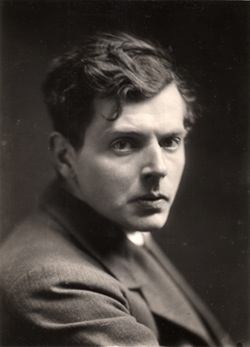I’ll be spending most of this weekend in Gloucester cathedral. I’m in the visiting choir singing the weekend’s services, which is a delight in itself, and by an amazing, happy coincidence, it’s the same weekend as Sarah Connolly’s Ivor Gurney festival, so I’ll be reviewing the evening concert. Sarah Connolly has been doing a great deal to champion Gurney’s music, and she hasorganised this festival to raise money for an Ivor Gurney memorial stained glass window, commissioned from Thomas Denny (he also created the sumptuous Transfiguration window in Durham Cathedral).
I have to confess that, probably like many others, I didn’t know anything about Gurney or his music until I heard Sarah Connolly talking about him on Radio 3 back in March. He was born in Gloucester in 1890, and in fact, his website tells me that today is his birthday. He studied at the RCM with Stanford and was a close friend of his Gloucester contemporary Herbert Howells: there’s a lovely story on the Gurney website about how he and Howells both determined on becoming composers after hearing the premiere of Vaughan Williams’s Fantasia on a Theme of Thomas Tallis at the Three Choirs Festival, and the English Chamber Orchestra will be playing it on Saturday.
Sadly Gurney’s career and mind were destroyed, like so those of many others, by World War I; he had already suffered a breakdown just before the war, and his experiences in the trenches broke him completely. He struggled on with daily life into the 1920s, during which time he composed most of the songs for which he is remembered, but eventually he had to be moved into a mental hospital, where he spent 15 years, before dying of tuberculosis in 1937.
While he was a student, he was often compared to Schubert, and there’s something of that in his songs, particularly in the piano writing, in the interplay between piano and voice, but on this Germanic framework, he hangs exquisitely English melodies, rich in the tonality of the great Tudor composers and of English folksong. Some of his songs are so deeply seeped in the folk idiom that it’s hard to believe that they’re original compositions, not arrangements: Ha’nacker Mill is a gorgeous lament setting words by Belloc, but sounds as if it’s been sung for centuries.
The best-known of Gurney’s songs is almost certainly Sleep, a setting of words by the Elizabethan poet John Fletcher; Gurney relishes Fletchers dreamy text, the gently rocking piano part and the long, languid phrases tempting us to abandon reality for the comfort of daydreams. Another song that has really grabbed my attention is By A Bierside, with unsettling words by John Masefield. It’s a meditation on death, and Gurney’s music captures the ambiguity of the poem, its mixture of terror and awe, coming to a climax and an awesomely long final note for the singer on the words It is most grand to die. It’s incredibly moving, words and music together and I was really shaken by it. Then I found on the website a picture of the mud-spattered manuscript: it was written in the trenches.
Gurney also wrote a lot of poetry, but didn’t set his own words; it seems that his greatest creative visions brought him music, and poetry was reserved for expressing a lesser degree of inspiration so it’s understandable that he kept them separate. Like the music, a lot of his poetry evokes his ingrained love of the Gloucestershire countryside, and reading it, one can imagine the soldier in the trenches searching for comfort in his visions of home. He combines poetry and music in a heart-rending little verse called Bach and the Sentry in which he recalls how his spirit was lifted whilst he was on duty by the memory of a Bach prelude, but then wonders how he will feel when he’s able to get home and play it again. Saturday’s concert marks Gurney’s poetry with readings by Simon Callow, and a choral new work by Judith Bingham, setting Gurney’s poetry, which will be performed by Tenebrae.
I’ve been exploring some of Gurney’s songs via Spotify in the last few days, and I’ve heard enough to understand why so many great musicians are coming to Gloucester this weekend to champion his music. I’m certainly hooked.
There’s lots more information on the Ivor Gurney Society webpage, and texts of some of the poems. www.ivorgurney.org.uk
(Oh, and by the way, if you’re in Gloucester for the festival, do come to choral evensong on Saturday at 4.30! Music includes canticles by Byrd and the first performance of Anthony Zerillo’s preces and responses).






